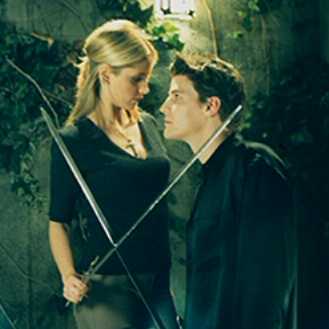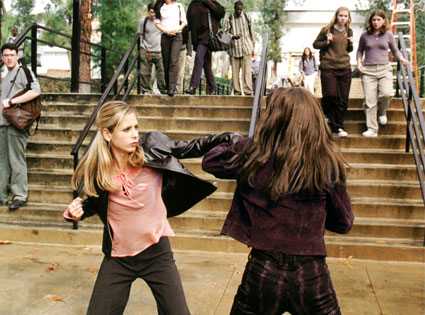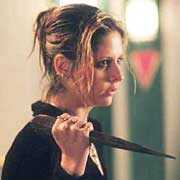| We must also return to the male figure which has dominated Buffy's life so often, Angel. In Becoming, Part I we are given numerous flashbacks into Angel's life - which essentially shows the audience how he has become who he is "today." In these flashbacks we see: a woman a sire angel (turning him into an evil vampire), a woman cursing him (giving him a soul back - turning him "good" - so that he must suffer for the destruction he caused when he was evil), and a young teenage girl (Buffy) turning him evil again by permitting him one true moment of happiness (having sex with him). From these flashbacks, we can clearly see that it is females who have defined and shaped Angel's life for him. This greatly plays into the castration complex, and is also potentially the reason for Angel's attempts to dominate Buffy - he feels threatened by her. We have also, on numerous occasions, seen Buffy save a shirtless angel which works in creating Buffy as the masculine figure and Angel as the castrated one (Undead TV, 2). This resonates especially with Buffy and Angel's encounter at the beginning of Surprise, where Buffy greets a shirtless Angel in the morning. She has seen Angel's fate of death in her dreams (and, as anyone who watches Buffy knows, her dreams always come true) and she is coming to save him. However, because he ignores her and silences her by kissing her, the dream does eventually come true - and it is Buffy herself who kills him. Which brings us back to my arguments in the first and second sections, where I state that men seem to dominate her (especially Angel). While it may seem that they dominate her, they never really do - Buffy also chooses her duty over them. "The deeply felt emotional bonds do not undermine the heroine's ability or independence. These men play a crucial role in their lives, but the heroines do not prioritize these relationships above others or above their duties" (Lotz, 78 - emphasis added). When Buffy realizes she must kill Angel to fulfill her duty, she doesn't let her emotional bond with him control that. |
 |



